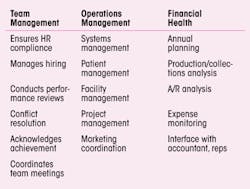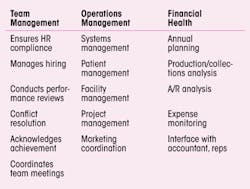Leadership dilemma
by Dianne Glasscoe Watterson, RDH, BS, MBA
Dear Dianne,
I work in a group practice of four doctors. The senior doctor in the group has always been the leader of the practice. If any of us had any questions or problems, he was the go-to person.
Recently, a decision was made to elevate one of the front desk assistants to the position of office administrator. This is a woman with no formal education and poor communication skills. I believe the decision was made based on her 22 years of tenure with the practice. She has a no-nonsense, stodgy personality and has rubbed many of us the wrong way over the years. It is clear that she has no empathy for the seven dental hygienists who work in the practice, nor does she have a good mental concept of what it takes to deliver high-quality patient care. She still thinks along the lines of "difficult prophy" when it comes to periodontal care.
In a staff meeting, we were all told that this woman would be responsible for any and all staff matters in the future. Basically, she will be my boss. My coworkers and I are quite unhappy that she will now be making decisions about how we are scheduled and evaluating our job performance. This really stinks! Is there any silver lining in this situation, or should I start looking for a new job?
Lauren, RDH
Dear Lauren,
It is easy for me to understand why the doctors felt there should be an office administrator position in the practice. Group practices have a different management dynamic than solo practices. Multiplied numbers of staff members are needed to attend the multiplied number of patients. As the group practice grows, doctors who try to perform dentistry and manage the practice simultaneously are likely to experience burnout and a general feeling of being overwhelmed.
The office administrator in a group practice is the most important position in the office. This individual carries a heavy management responsibility in making sure all systems run smoothly. In a nutshell, responsibilities are divided into three key categories:
The ideal candidate should be someone with these characteristics:
- Thorough knowledge of clinical procedures
- Excellent interpersonal and relationship skills
- The ability to be firm, yet graceful
- Calm under pressure
- Professional and friendly
- Knowledge of current labor laws (a human resource background is helpful)
- Empathetic and egoless
- Loyal, punctual, hardworking, and organized
- Possessing leadership qualities
From the description in your post, it would appear that the new office administrator is lacking in some key areas needed for a successful transition. If there's any chance of success here, the new OA will need some training to learn how to manage without being dictatorial. It's unfortunate that many business assistants in dental practices are afforded the least amount of training of any of the staff members. That needs to change. Without the proper training, the newly promoted OA is like a nonswimmer who has been thrown into the ocean without a life preserver. The situation becomes a "sink or swim" scenario fraught with pain, resentment, frustration, and ultimately staff turnover.
It sounds like the doctors took the easy way out and promoted from within rather than looking outside the practice for a better candidate. Maybe they thought they would save money this way. There's nothing wrong with promoting from within if there's an individual who meets the qualifications. But to promote someone whose greatest credential is 22 years of longevity is not prudent. If the doctors are not willing to invest in some one-on-one training with a consultant or at least send her for some formal training, they have no one but themselves to blame for the negative consequences that will inevitably affect the practice's bottom line.
The doctors should also consider the high cost of staff turnover in a dental practice. The Society for Human Resource Management estimates that it costs $3,500 to replace one $8-per-hour employee when all costs -- recruiting, interviewing, hiring, training, reduced productivity, etc. -- are considered. This is a very conservative estimate, as it should be understood that turnover costs can be significantly higher, especially when patients also leave. Patients have been known to follow their favorite hygienist to a competing practice. Patients also leave when good customer service is lacking. Business assistants who do not have the proper telephone skills, professionalism, or general business acumen can do great damage to a practice. Who can value the lifetime worth of a patient?
As to your current dilemma, the best advice I can give you -- if you want to keep your job -- is to make the best of the situation. Try not to judge your office administrator until she has had a chance to settle into the new position. Try to work with her instead of against her. Think of how you would feel if you were in her position. I can imagine there is considerable uncertainty on her part as to her new role. If she still has the mindset of "difficult prophy" regarding periodontal care, she's woefully behind times, and the doctors are to blame. They may even have that same mindset!
I can understand your frustration with the situation. The reality is that there are some things in life that we cannot change, including other people. But people can change themselves. If your new OA is going to be successful, she will need to be willing to learn how to be a manager who leads rather than drives people. If she does not possess those skills and is not willing to learn, she will fail.
I believe that dental hygienists make good office administrators, because they possess great clinical knowledge. I have worked with several OAs in consulting capacities who were formerly dental hygienists. Some have had to leave clinical hygiene because of physical issues that precluded them from delivering clinical care. Many dental hygienists possess excellent communication skills, and some even have formal business education, which makes them ideal candidates for business administration.
I challenge you to be the "leader" with your coworkers in adopting a new attitude about the new position in your office. With the support of her coworkers, your OA's transition will be less difficult. I know it doesn't feel great that a coworker that you generally dislike has suddenly been placed in a management position above you. At the very least, though, give her a fighting chance to be successful. Remember, she was asked to take on this role, which is an honor. The doctors must have seen something in her that made them feel she could fulfill the role. If things go from bad to worse, discreetly recommend to the doctors that they provide her with needed training. If they refuse, the practice is sure to suffer, and the OA may lose her job. RDH
All the best, Dianne
DIANNE GLASSCOE WATTERSON, RDH, BS, MBA, is a professional speaker, writer, and consultant to dental practices across the United States. Dianne's new book, "The Consummate Dental Hygienist: Solutions for Challenging Workplace Issues," is now available on her website. To contact her for speaking or consulting, call (301) 874-5240 or email [email protected]. Visit her website at www.professionaldentalmgmt.com.
Consider reading:The micromanaging boss
Consider reading:6 ways to reduce cancellations and broken dental appointments
Consider reading:Workplace videotaping makes hygienist uneasy
Past RDH Issues

